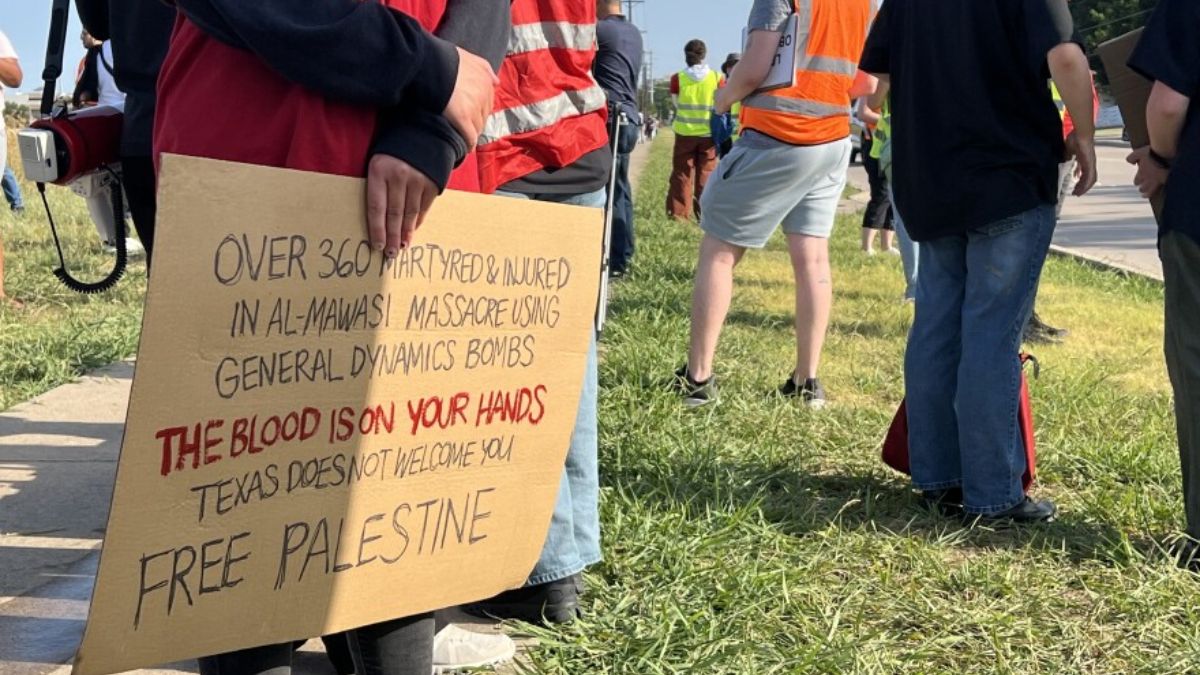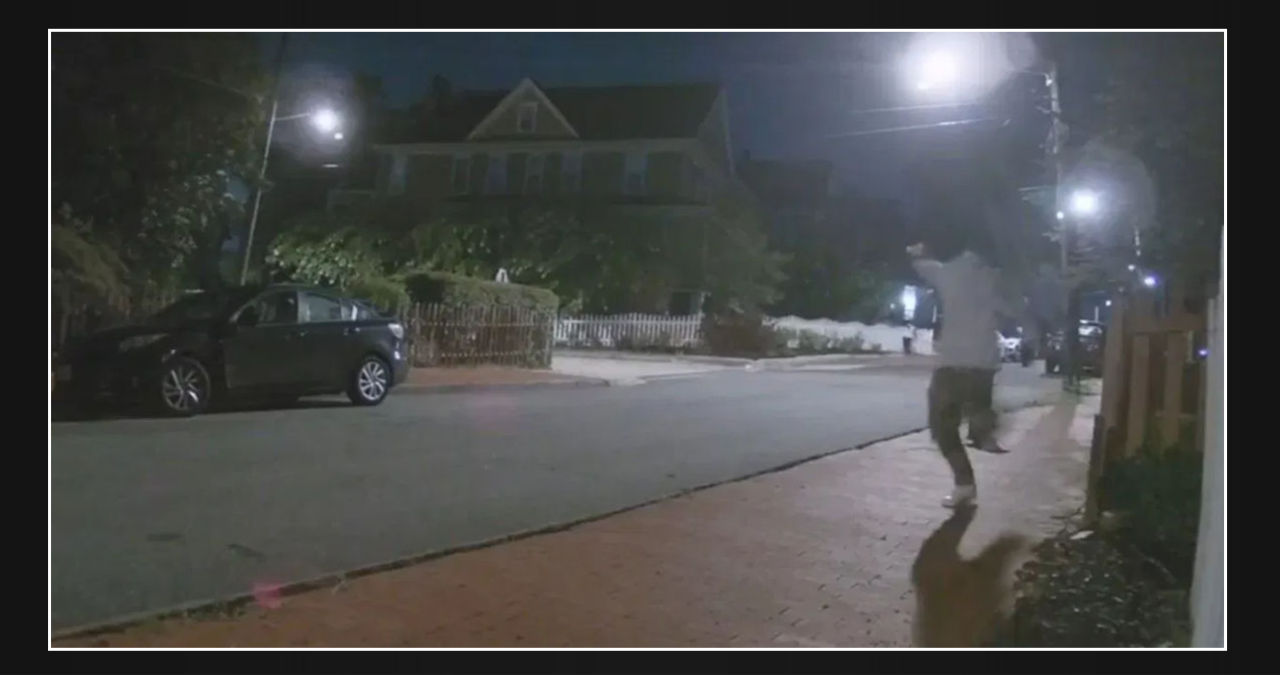As the temperature neared 100 degrees on a Tuesday evening in Garland, a crowd of people gathered outside the General Dynamics plant. Chanting and waving Palestinian flags, they held signs and used keffiyehs to shield themselves from the scorching sun.
The defense contractor operates plants throughout the United States and is responsible for producing MK-80 bombs. These bombs have been utilized in Israel’s attacks on Gaza. In March, a protest against the war resulted in the arrest of twenty-three individuals outside the plant.
Two months ago, a pro-Palestinian encampment on campus led to the arrest of several University of Texas at Dallas students. These same students were among the rallygoers present at the recent event.
According to Nouran Abusaad, one of the students who were arrested, the university is not willing to listen to their demands for divestment. They seem to be so adamant about it that instead of making ethical investment decisions and supporting their Palestinian students, they prefer to suppress and send state troopers and police after their own students.
This week, Abusaad and other students will face disciplinary hearings held by the university. The outcome of these hearings could range from probation to suspension or even expulsion, leaving the academic fate of the students uncertain.
UTD community members are urging the university system to disinvest from weapons corporations linked to Israel’s conflict in Gaza, including Raytheon, Lockheed Martin, and Northrop Grumman.
Following the Oct. 7 Hamas-led attack that resulted in the death of approximately 1,200 people, Israel launched an offensive in Gaza. Palestinian health authorities report that over 38,000 individuals, primarily civilians, have been killed in Israel’s air and ground attacks, while over 2 million have been displaced from their homes.
Abusaad bravely defied the risk of punishment and her conditional release from jail to express her dissent towards the war by participating in the protest.
As a Palestinian organizer, the rising senior acknowledges that their safety within the university is not guaranteed. The fear of being silenced due to their Palestinian identity is a constant source of concern. Nevertheless, they remain inspired by the resilience of their people in Palestine.
After the arrests
On May 1, UTD’s Chess Plaza encampment saw the arrest of 21 individuals. This included three professors and nine students who were arrested for criminal trespassing. Despite the arrests, supporters of the encampment continued to show their support by camping outside the jail throughout the night.
On May 2, the Collin County Jail released the protesters, but they were not without conditions. According to the arrestees, they were prohibited from entering the campus except for class and class-related activities. The same applied to the professors, who were only allowed to enter for work and work-related activities. As of now, their criminal cases are still pending.
KERA News was able to obtain a letter confirming that the university is currently looking into the actions of the arrested students. It is being investigated if they violated any school rules, such as exhibiting disruptive behavior, obstructing access to institutional facilities, failing to comply with the instructions given by a university official, or any other alleged violations of the Student Code of Conduct.
The credit for the given figure goes to Juan Salinas II.
As a legal observer at the campus encampment, Lee Mulupi volunteered to serve, despite not being a student. Mulupi anticipated being among those arrested once the police arrived but remained hopeful of safeguarding the students.
The students facing disciplinary action have sparked anger among Mulupi and others.
Mulupi expressed her admiration for individuals who were willing to put everything on the line for a cause they believed in. She stated that knowing the possibility of negative consequences and still being committed to their beliefs makes her hold these people in high regard. To Mulupi, their level of dedication and care is truly remarkable.
According to Brittany Magelssen, a spokesperson for the university, the school cannot disclose any information regarding the disciplinary measures taken against the students, as it would violate their privacy rights. At this time, there has been no confirmation or explanation regarding the professional repercussions that the faculty members involved may face.
In April, UT Austin witnessed pro-Palestinian protests where over 100 people were arrested for criminal trespass in Travis County. Although all charges against them were dropped, four students were notified of their discipline this month. The penalties imposed on them included deferred suspension, which is similar to probation, as well as actual suspension.
How the hearings are supposed to go
According to the Student Code of Conduct, if a student contests accusations of violating university regulations, they have the option to appear before a hearing officer or panel consisting of UTD’s Discipline Committee faculty, staff, and students. At least five days before the hearing, the student must receive written notification of the hearing.
When presenting evidence documents and witnesses, students are allowed to provide a summary of what their witnesses will testify about. It is important to note that an advisor may accompany the student, but they are not permitted to question witnesses, make arguments or objections, or bring evidence. If the student chooses to have an attorney as their advisor, the dean of students may also have legal representation through the Office of the General Counsel of the UT System.
During the hearings, the dean and the student present their opening statements and evidence, similar to the proceedings of a trial. Witnesses from both sides are presented and are subject to questioning from each party.
After both the dean and the student present their concluding statements, the hearing panel or officer will make a decision on whether the student is responsible for the alleged violations. If found guilty, sanctions may be imposed, which could include disciplinary probation, the withholding of grades or a degree, suspension, or expulsion. If a student is dissatisfied with the outcome, they have the option to appeal to the vice president of student affairs.
After being released from jail in May, Mousa Najjar graduated with a degree in computer science just over a week later. However, his celebration was short-lived as he was arrested again on June 27th for criminal trespass. His offense? Holding up a Palestinian flag with the message “divest from death” as he walked across the stage during his graduation ceremony.
After being escorted off the stage and out of the campus, Najjar claimed that his diploma and transcripts were withheld from him. However, after the Dallas Morning News published an article about his experience, the holds were released just a day later. Najjar stated that his hearing is still upcoming.
He expressed disbelief at the fact that a university could turn against its own students, including those who have graduated and those who are still paying tuition. “It’s just unbelievable,” he remarked.
This Article Includes







